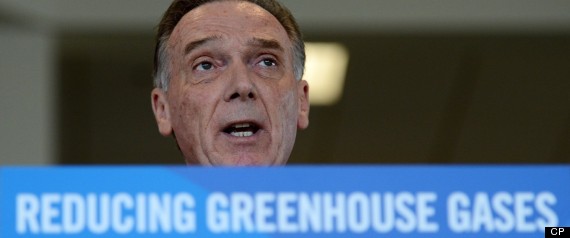 Canada has the worst climate change policy of all wealthy nations, and the fourth-worst among all nations, says a survey from environmental umbrella group Climate Action Network.
Canada has the worst climate change policy of all wealthy nations, and the fourth-worst among all nations, says a survey from environmental umbrella group Climate Action Network.The Great White North “still shows no intentions to move forward on climate policy and thereby leave its place as the worst performer of all western countries,” reads the preamble to the Climate Change Performance Index 2013.
Canada ranked 58th out of 61 countries surveyed in the latest issue of the index, ahead of only Kazakhstan, Iran and Saudi Arabia.
Topping the rankings were three European countries: Denmark, in first place, followed by Sweden and Portugal, respectively. The U.S. ranked 43rd, which was still ahead of Japan, Greece and the Netherlands.'
The index measures current emissions levels, emissions trends, energy efficiency, efforts at renewable energy, and government climate policy. Canada received a ranking of “poor” on energy efficiency, and a ranking of “good” on emissions trends.
But it received the worst grade — “very poor” — on current emissions, renewable energy and climate policy.
“At a time when institutions such as the World Bank and the International Energy Agency are calling for more climate action it is disappointing to have so many countries still being reluctant to move forward. Canada is a strong example of this lack of willingness to improve climate policies,” Wendel Trio, director of the Climate Action Network-Europe, said in a statement.
Nearly 200 countries are meeting in Doha, Qatar, this week to try once again to reach an elusive international agreement on efforts to slow global warming and avert growing extreme weather events.
“The Government of Canada is committed to working with our partners to find global solutions to the global climate change problem,” Environment Minister Peter Kent told the conference. “In fact, Canada is taking action on all fronts—domestic, continental and international—to address the challenges of climate change.”
Environmental groups beg to differ. The Climate Action Network has singled Canada out before, awarding the country its “Fossil of the Year” award in 2011 during the Durban round of climate negotiations, for what some observers said were efforts to prevent a climate policy agreement.
“Canada’s actions have become so egregious that they have been left behind on the sidelines of global climate progress,” the Climate Action Network said at the time.
It was the fifth year in a row Canada received the dubious distinction.
United Nations Secretary-General Ban Ki-Moon said on the sidelines of the Doha conference that wealthy nations are primarily to blame for climate change and should therefore take the lead in combating the problem.
In doing so, the UN chief appeared to be taking the side of developing countries such as China, which have long insisted that they be exempt from tough emissions standards because their economies are still working to catch up with the West.
"The climate change phenomenon has been caused by the industrialization of the developed world," Ban told The Associated Press. "It's only fair and reasonable that the developed world should bear most of the responsibility."
The world’s governments agreed in 2011 to adopt a global climate change treaty by 2015. The Doha talks are aimed at producing an agreement that can be put into force by that date.
Original Article
Source: huffington post
Author: Daniel Tencer
No comments:
Post a Comment